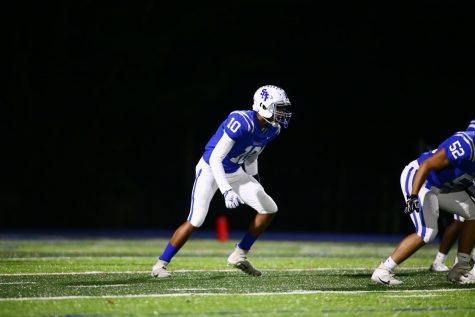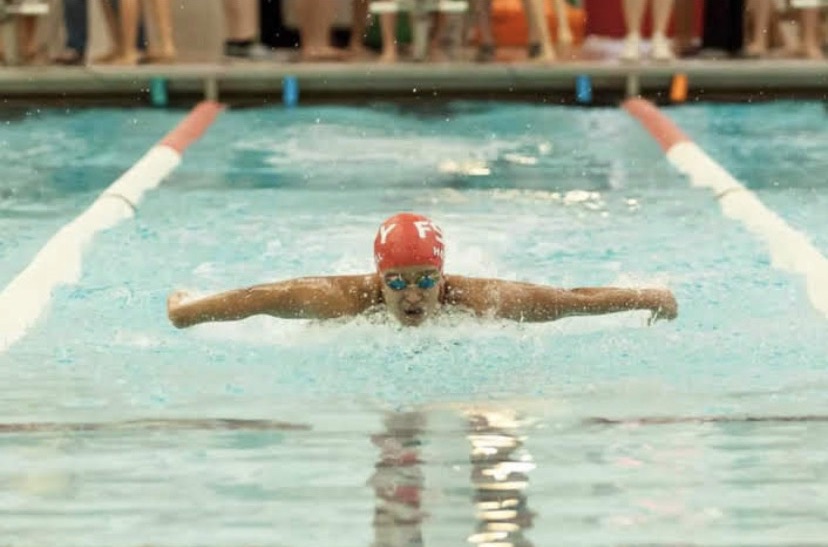Collegiate Athletes Stand Up For Social Justice and Inspire SPFHS Athletes
Photo Courtesy of Chloe Howell
Senior Chloe Howell swims butterfly. Howell began to be increasingly passionate about social justice issues throughout her high school swimming career.
December 23, 2021
The National Anthem is blaring through the loudspeakers per pre-game ritual. The crowd stands with their right hands over their hearts.
Except for most of the Drexel Dragons.
Most of the team is taking a knee.
With awareness of social injustice sweeping the nation, many professional and collegiate athletes are using their platforms to support and bring awareness to causes. Alliance is displayed in a plethora of ways, whether it be on the sidelines of a game, before or after, posting a foundation on social media or just showing up to a protest.

“I think it’s important just because [college athletes are] people too, just like everyone else,” student athlete Isaiah Nathaniel said. “So it’s kind of important for them to be able to speak their mind and then everyone has freedom of expression. So it’s kind of unconstitutional to say that they shouldn’t have the platform to advocate for social justice like they have.”
During this past year’s highly-anticipated annual NCAA Men’s March Madness tournament, many members of the Drexel Dragons took a knee during the national anthem. Supported by head coach Zach Spiker, the Drexel Dragons regularly hold conversations about social climate on the team. Reportedly, those who knelt during the national anthem did so before most games for the majority of the team’s 2020-2021 season.
Many female athletes are also taking strides on current social justice issues. For example, according to the NCAA article titled, “College Athletes Using Platforms to Speak Out on Social Justice Issues,” Baylor volleyball player Presile Andreson attended Black Lives Matter protests, wrote a poem about her personal experiences with racial injustice, and continues to advocate for these causes off the court.
“I think [athlete’s activism] would have an influence on younger athletes because when you’re younger, you want to get better and you’re looking at these top athletes,” senior swimmer Chloe Howell said. “What you hear them say really resonates. If it resonates with you, it’s gonna make a big difference.”
Some collegiate athletic programs have truly put in the effort to encourage and give student athletes a voice for social justice, besides just doing it on their own or as a team. For example, Boston University’s athletic program now has a Social Justice and Inclusion Committee, a committee of student-athletes and coaching staff that meets bi-weekly to work on small and larger social justice initiatives on and off campus.
“[The Social Justice and Inclusion Committee] has encouraged a lot of people,” Nathaniel said. “I’ve seen a lot of student athletes in the school just advocate for what they believe. [Professional atheltes are] further away from us, but since college athletes are closer in age, when people see [them be advocates for social causes] we definitely get more encouraged for advocacy.”
While great strides for social justice are made by professional athletes as well, efforts made by collegiate athletes have a greater impact. These athletes are closer in age to high school student athletes and college teams are still in the hearts of their alumni, who still show up game after team to cheer them on as they compete.
Richard McGriff has been a high school sports coach at SPFHS for more than 25 years. During his career he has coached football and still continues to coach track and field. McGriff is also a former D1 collegiate athlete himself.
“Just being an athlete does not make you knowledgeable about what you’re speaking about,” McGriff said. “Whenever it comes down to people speaking out about this, you could either speak from your experience and leave it at that, or educate yourself on the subject and speak about it, you know. So having a platform is great, and it should be used. But just make sure, don’t speak out of ignorance.”
College athletes continuing to be outspoken for social intivates and causes have inspired younger athletes and former athletes alike. Even for non-athletes, the continuous efforts made by these students is deeply impactful.
“[Seeing athletes speak on social issues] just makes me feel proud of them just for speaking out because I know it’s controversial, so even just taking that step actually just makes me admire them more than I did before,” Nathaniel said.



